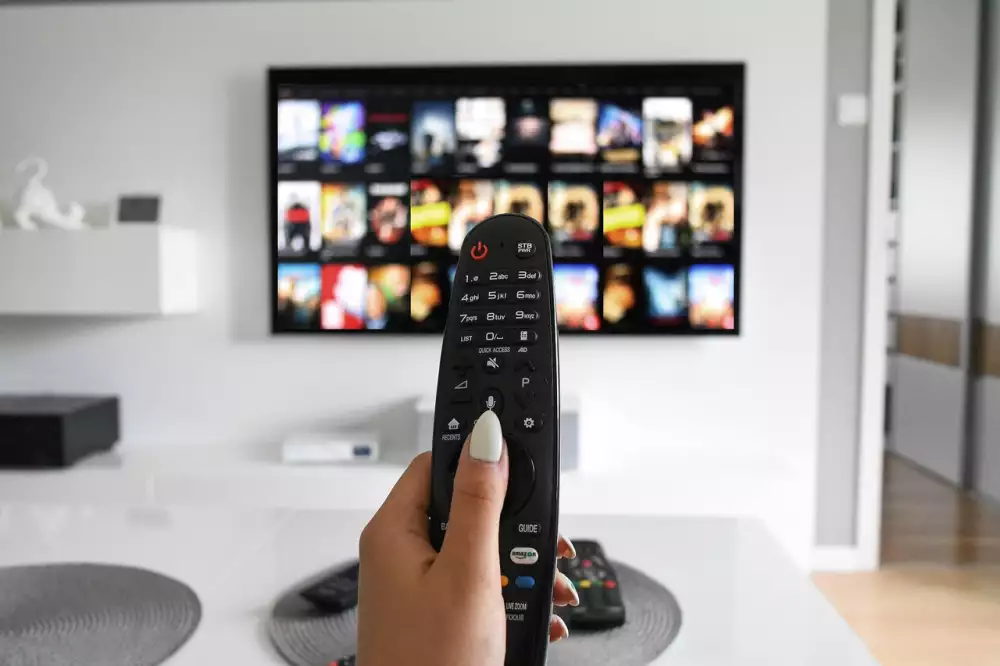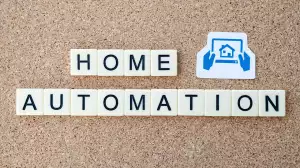Home Control Revolutionizing Modern Living

Smart Home Basics
Imagine coming home to a perfectly lit house, at the ideal temperature, all without lifting a finger. That's the allure of a smart home. At its core, a smart home uses technology to provide you with greater control and convenience in managing various aspects of your living space.
The heart of any smart home is the ability to control devices and appliances remotely. Imagine adjusting your thermostat from your phone while you're at work, ensuring a comfortable temperature upon your arrival. Smart lighting goes beyond simple on/off functionality, allowing you to dim lights, change colors, and even set schedules to match your daily routine.
Security is another area where smart homes shine. Connected security cameras provide real-time monitoring of your property, sending alerts to your phone if any unusual activity is detected. Smart locks eliminate the need for physical keys, allowing you to lock and unlock your doors remotely and even grant temporary access to guests.
The beauty of a smart home lies in its ability to adapt to your lifestyle. Whether you're looking for increased comfort, enhanced security, or simply a more convenient way to manage your home, smart home technology offers a wide array of possibilities.
Common Applications
Home control systems are becoming increasingly popular, as they offer a wide range of benefits that can make life easier and more comfortable. With a home control system, you can control various aspects of your home, such as lighting, temperature, appliances, and security systems, from a central location. This can be done using a smartphone, tablet, or computer, giving you complete control over your home, no matter where you are.
Lighting Control
One of the most popular applications of home control is lighting control. With smart lighting, you can turn lights on and off, dim them to create the perfect ambiance, and even set schedules to automate your lighting based on your daily routine or preferences. This not only adds convenience but also helps conserve energy by ensuring lights are not left on unnecessarily.
Temperature Control
Another common application is temperature control. Smart thermostats allow you to set schedules and adjust the temperature of your home remotely. These intelligent devices learn your preferences and make automatic adjustments, ensuring optimal comfort while maximizing energy efficiency. Imagine pre-heating your home on your way back from work or setting the perfect sleeping temperature - all at your fingertips.
Appliance Control
Home control extends to appliances as well. Imagine starting your coffee maker while still in bed or preheating the oven on your way home from the grocery store. With a connected home, you can manage and monitor various appliances, from refrigerators to washing machines, adding a new level of convenience to your daily routines.
Security Systems Integration
Security systems are also seamlessly integrated into home control systems. Arm or disarm your alarm system remotely, receive real-time notifications about unusual activities, and even monitor security cameras - all from your smartphone. This provides peace of mind and allows you to keep a watchful eye on your home, no matter where life takes you.
Lighting Control
Lighting control is a key aspect of home automation, allowing you to manage your lights for convenience, security, and energy efficiency. With a home control system, you can adjust the brightness, color temperature, and even the color of your lights using a smartphone app, voice commands, or pre-set schedules.
Imagine arriving home to a well-lit house without having to touch a single switch. Or, picture your lights gradually brightening in the morning to simulate a natural sunrise. Lighting control can also enhance your home's security by making it appear occupied when you're away. You can program lights to turn on and off at random intervals, deterring potential intruders.
Furthermore, smart lighting can contribute to significant energy savings. By dimming lights or automatically turning them off when rooms are empty, you can reduce your electricity consumption and lower your carbon footprint. Many lighting control systems also offer energy monitoring features, providing insights into your usage patterns and identifying areas for improvement.
Thermostat Regulation
Thermostat regulation is at the heart of a comfortable and energy-efficient home. Smart thermostats take this a step further by learning your preferences and adjusting the temperature automatically. Imagine waking up to a perfectly warmed house on a cold winter morning or coming home to a cool and refreshing environment after a long day. Smart thermostats can make this a reality while helping you save money on your energy bills. These intelligent devices learn your daily routines and temperature preferences, creating a personalized schedule that adapts to your lifestyle. They can even use your location data to determine if anyone is home and adjust the temperature accordingly, ensuring you're not heating or cooling an empty house. Some smart thermostats offer advanced features like remote control through smartphone apps, allowing you to adjust the temperature from anywhere, anytime. You can monitor energy usage, receive maintenance reminders, and even integrate your thermostat with other smart home devices for seamless control.
Security Systems
Security systems have evolved from simple alarm systems to sophisticated smart home protectors. Integrated with your home control system, they offer comprehensive security and peace of mind. Imagine receiving a notification on your smartphone if your security camera detects unusual activity while you are away. You can instantly view the live feed, trigger an alarm, or even speak through a two-way intercom to deter potential intruders. Smart locks can be integrated with your system, allowing you to remotely grant access to trusted individuals, monitor entry history, and receive alerts for any unauthorized attempts. Some systems offer environmental monitoring capabilities. They can detect smoke, carbon monoxide, and water leaks, sending instant alerts to your phone and triggering automated responses like shutting off the water supply or sounding an alarm. By integrating your security system with your home control hub, you gain a powerful tool for protecting your loved ones and belongings.
Entertainment Setup
Imagine transforming your living room into a home theater with a single voice command or a tap on your smartphone. With a smart home entertainment setup, this futuristic vision becomes a reality. Control your television, sound system, streaming devices, and even gaming consoles seamlessly. Adjust the lighting to create the perfect ambiance for movie night – dim the lights gradually as the opening credits roll, or synchronize smart bulbs with your music for an immersive audio-visual experience.
Don't stop at the living room! Extend this level of control throughout your entire home. Imagine starting a playlist in the kitchen while you cook, and having it seamlessly follow you to the living room as you move. Smart home technology makes it all possible, offering a level of convenience and personalization that elevates your entertainment experience.
Voice Assistants
Voice assistants are transforming the way we interact with our homes. With just a few spoken words, you can control a wide range of smart home devices, including lights, thermostats, appliances, and entertainment systems. Imagine walking into your home and simply saying, "Turn on the lights" or "Set the temperature to 72 degrees." Voice assistants make these tasks effortless and convenient.
One of the key benefits of using voice assistants for home control is enhanced accessibility. For people with mobility impairments or disabilities, using traditional switches or controls can be challenging. Voice assistants provide a hands-free alternative, allowing them to easily manage their home environment.
Moreover, voice assistants offer increased convenience and efficiency. Instead of manually adjusting multiple devices, you can use voice commands to control everything from a central location. For example, you can create routines or "scenes" that automate multiple actions with a single command. Saying "Good night" can turn off the lights, lock the doors, and adjust the thermostat, all at once.
Popular voice assistants, such as Amazon Alexa, Google Assistant, and Apple Siri, integrate seamlessly with a wide range of smart home ecosystems. This compatibility ensures that you can find compatible devices from various manufacturers, giving you flexibility and choice in designing your smart home setup.
Smart Appliances
Smart appliances are transforming our homes into interactive and automated living spaces. These appliances, equipped with internet connectivity and advanced sensors, offer unprecedented control over various aspects of our home environment.
One area where smart appliances shine is home control. Imagine adjusting your thermostat, turning on lights, or even preheating your oven, all from your smartphone or with voice commands. Smart thermostats, for instance, learn your preferences and automatically adjust the temperature, optimizing energy consumption while ensuring comfort. Smart lighting systems allow you to create personalized lighting schedules and remotely control individual lights or groups of lights.
Beyond convenience, smart appliances contribute to enhanced home security. Smart security systems integrate seamlessly with other smart devices, providing real-time monitoring and alerts. Smart doorbells with integrated cameras allow you to see who's at the door, even when you're away. Smart locks enable keyless entry and can be controlled remotely, granting access to trusted individuals.
The kitchen is another area where smart appliances are making their mark. Smart refrigerators can help you manage your grocery list, track expiration dates, and even suggest recipes based on available ingredients. Smart ovens offer precise temperature control, remote preheating, and even the ability to download and execute cooking programs.
As technology advances, we can expect even more innovative smart appliances to emerge, further blurring the lines between the physical and digital realms within our homes.
Energy Management
Energy management is quickly becoming a key feature of modern smart homes. By integrating smart devices and systems, homeowners can gain unprecedented control over their energy consumption, leading to both cost savings and a reduced environmental footprint.
Smart thermostats are a prime example, learning your temperature preferences and adjusting automatically throughout the day. These intelligent devices can factor in occupancy, weather conditions, and even your energy provider's rates to optimize heating and cooling schedules for maximum efficiency.
Smart lighting takes energy conservation a step further by allowing you to control individual lights or groups of lights remotely or through automated schedules. Features like dimming and motion sensing ensure lights are only used when and where needed, drastically reducing wasted energy.
Beyond individual devices, a centralized home control system can tie everything together, creating a truly energy-efficient ecosystem. Imagine a "Goodnight" scene that not only turns off the lights but also adjusts the thermostat, powers down electronics, and arms the security system, all with a single command or at a pre-set time.
The benefits of smart home energy management extend beyond the immediate impact on your wallet and the environment. By providing detailed insights into your energy usage patterns, these systems empower you to make informed decisions about your consumption habits and identify areas for further optimization. As technology advances, we can expect even more innovative solutions to emerge, making energy-efficient living not just a possibility but a seamless part of the modern home.
Home Automation
Home automation, or smart home technology as it's often called, is transforming the way we live. At its core, it's about using technology to control various aspects of your home, making life more convenient, comfortable, and secure. Imagine controlling your lights with a simple voice command or having your thermostat automatically adjust the temperature before you even walk in the door. That's the power of home automation.
One of the most popular applications is smart lighting. Imagine dimming the lights for movie night or waking up to a gradually brightening bedroom light instead of a jarring alarm clock. Smart thermostats are another game-changer, learning your preferences and adjusting the temperature throughout the day to save energy and keep you comfortable. And let's not forget about security. Home automation systems can include smart locks, security cameras, and motion sensors that can be controlled remotely, giving you peace of mind whether you're home or away.
The beauty of home automation is its flexibility. You can start small, perhaps with a smart speaker or a few smart bulbs, and gradually add more devices as your needs and budget allow. With so many options available, you can customize your smart home to fit your lifestyle and preferences.
DIY vs. Professional
Smart home technology offers unparalleled convenience, but setting it up presents a choice: DIY or professional installation? Let's explore the pros and cons of each.
DIY Smart Home Setup
Pros:
- Cost savings: You only pay for devices and subscriptions.
- Enjoyable and rewarding experience for tech enthusiasts.
Cons:
- Time-consuming: Research, selection, and installation can be lengthy.
- Compatibility issues: Devices from different manufacturers might not play well together.
- Technical expertise sometimes needed: Complex systems may require wiring or networking knowledge.
Professional Smart Home Installation
Pros:
- Expertise and experience: Professionals design a system tailored to your needs.
- Seamless integration: They ensure all components are compatible and work together.
- Ongoing support and maintenance: Peace of mind knowing issues will be addressed promptly.
Cons:
- Higher cost: Installation fees can add up, especially for complex systems.
- Limited product selection: You might be restricted to the installer's preferred brands and services.
Ultimately, the best approach depends on your budget, technical skills, and the complexity of your desired smart home setup. Carefully weigh the pros and cons to make an informed decision.
Privacy Concerns
The convenience of controlling your home with a tap on your smartphone comes with inherent privacy concerns. Smart home devices collect a significant amount of data about your daily routines, including when you're home, your sleeping habits, and even your energy consumption patterns. This data, if not properly secured, can be vulnerable to cyberattacks and data breaches, potentially exposing your personal information to malicious actors.
Furthermore, many smart home devices rely on cloud-based services for processing and storage. While this enables advanced features and remote access, it also raises concerns about data privacy and security practices of third-party providers. The possibility of your data being shared or sold to advertisers without your explicit consent is a valid concern for many users.
Additionally, the always-listening nature of some voice-activated smart home devices raises concerns about unauthorized audio recording and potential misuse of personal conversations. It's crucial to carefully review the privacy policies and security features of any smart home device before integrating it into your home network. Opt for devices and platforms that prioritize data encryption, offer granular privacy controls, and have transparent data usage policies.
Future of Home Control
The future of home control is brimming with exciting possibilities. Imagine a home that anticipates your needs and seamlessly adapts to your preferences. As technology advances, we can expect to see even more sophisticated and intuitive home control systems. Artificial intelligence (AI) will play a pivotal role, enabling our homes to learn our routines, anticipate our needs, and automate tasks with minimal human intervention. Voice control will become increasingly prevalent, allowing us to effortlessly control various aspects of our homes with simple commands.
Smart home devices will become more interconnected, creating a seamless ecosystem that optimizes comfort, energy efficiency, and security. We can envision homes that automatically adjust lighting and temperature based on occupancy, time of day, and even our personal preferences. Smart appliances will communicate with each other and with us, streamlining household chores and simplifying our lives.
The future of home control also holds tremendous potential for enhanced accessibility and independent living. For elderly individuals or those with disabilities, smart home technologies can provide increased independence and peace of mind. Voice-activated assistants, automated medication reminders, and remote monitoring systems can greatly enhance safety and well-being.
Publikováno: 21. 06. 2024
Kategorie: Technology



